Burns Park was a baseball park located in Detroit, Michigan that served three seasons as the exclusive Sunday home of the Detroit Tigers baseball club in the American League from 1900 through 1902.
Burns Park was a baseball park located in Detroit, Michigan that served three seasons as the exclusive Sunday home of the Detroit Tigers baseball club in the American League from 1900 through 1902.
Burns Park was built in response to blue laws, which prevented Sunday games from being played at Bennett Park, the team's primary baseball park. The park was named for the Tigers' then-owner, James D. Burns, who built the ballpark on his own property.
Sources are in some conflict about the exact location of the ballpark. Some have placed it on a triangular block between Livernois Avenue, Vernor Highway, and railroad tracks. However, contemporary sources place it at "south of the stock yards, at the corner of Waterman and Dix Avenues" [Detroit Free Press, April 25, 1900, p. 8]; and Polk's 1901 Detroit City Directory states "southwest corner Toledo and Waterman Avenues." Toledo was later renamed Vernor Highway, and Dix Street merges into Vernor Highway at the Waterman intersection. Marc Okkonen, in his book Minor League Baseball Towns of Michigan (Dickinson Press, 1997) also places the ballpark at the southwest corner of Waterman and Vernor. One source described the location as "near the stockyards in Springwells Township, just past the Detroit city line." Being outside the city limits was key to being able to play Sunday ball there.
The April 25, 1900, newspaper report stated that park was to have covered seating for 1,200 and open bleachers for about another 2,300. The only known references to the park are text; no photographs or diagrams of the park are known to exist.
The American League of 1900 was a minor league, previously called the Western League. The first game at the park was held on May 6, 1900, with the Tigers losing to the Indianapolis Hoosiers 11–5.[Detroit Free Press, May 7, 1900, p. 8]
The American League declared itself a major league in 1901 and broke relations with the National League. On April 28, 1901, the first major league game was played at the ballpark in which the Tigers defeated the Milwaukee Brewers 12–11.
With peace between the leagues for 1903, the Tigers were advised to abandon Burns Park as being in an unsavory part of town, by which time Burns had sold the club anyway, so Burns Park ceased being a host to professional baseball.
The Tigers wrapped up their usage of Burns Park on September 7, 1902, with an 11–6 win over the Baltimore Orioles. In subsequent years they played a handful of Sunday "home" games in other cities, until finally securing permission to play Sunday ball at Bennett Park in August 1907.
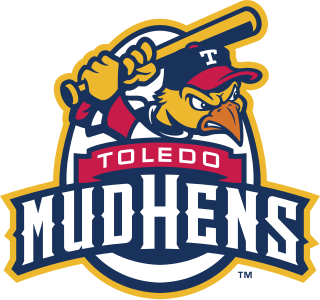
The Toledo Mud Hens are a Minor League Baseball team of the International League and the Triple-A affiliate of the Detroit Tigers. They are located in Toledo, Ohio, and play their home games at Fifth Third Field. A Mud Hens team has played in Toledo for most seasons since 1896, including a 50-year history as a member of the now defunct American Association. The current franchise was established in 1965. They joined Triple-A East in 2021, but this was renamed the International League in 2022.

Tiger Stadium, previously known as Navin Field and Briggs Stadium, was a multi-use stadium located in the Corktown neighborhood of Detroit, Michigan, United States. The stadium was nicknamed "The Corner" for its location at the intersection of Michigan and Trumbull Avenues. It hosted the Detroit Tigers of Major League Baseball (MLB) from 1912 to 1999, as well as the Detroit Lions of the National Football League (NFL) from 1938 to 1974. Tiger Stadium was declared a State of Michigan Historic Site in 1975 and has been listed on the National Register of Historic Places since 1989.
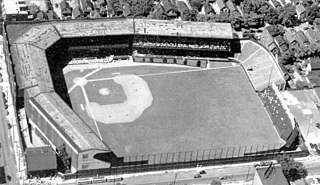
League Park was a baseball park located in Cleveland, Ohio, United States. It was situated at the northeast corner of Dunham Street and Lexington Avenue in the Hough neighborhood. It was built in 1891 as a wood structure and rebuilt using concrete and steel in 1910. The park was home to a number of professional sports teams, most notably the Cleveland Indians of Major League Baseball. League Park was first home to the Cleveland Spiders of the National League from 1891 to 1899 and of the Cleveland Lake Shores of the Western League, the minor league predecessor to the Indians, in 1900. From 1914 to 1915, League Park also hosted the Cleveland Spiders of the minor league American Association. In the 1940s, the park was also the home field of the Cleveland Buckeyes of the Negro American League.

Bennett Park was a ballpark in Detroit. Located at Michigan and Trumbull Avenues, it was home to the Detroit Tigers and was named after Charlie Bennett, a former player whose career ended after a train accident in 1894.
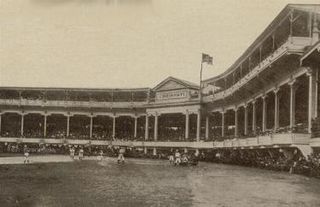
Palace of the Fans was a Major League baseball park located in Cincinnati, Ohio. It was the home of the Cincinnati Reds from 1902 through 1911. The ballpark was on an asymmetrical block bounded by Findlay Street (south), Western Avenue, York Street (north) and McLean Avenue (west).
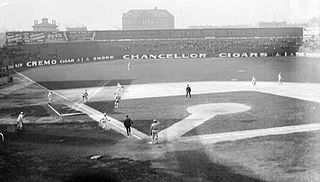
South Side Park was the name used for three different baseball parks that formerly stood in Chicago, Illinois, at different times, and whose sites were all just a few blocks away from each other.
The St. Louis Stars, originally the St. Louis Giants, were a Negro league baseball team that competed independently from as early as 1906 to 1919, and then joined the Negro National League (NNL) for the duration of their existence. After the 1921 season, the Giants were sold by African-American promoter Charlie Mills to Dick Kent and Dr. Sam Sheppard, who built a new park and renamed the club the Stars. As the Stars, they eventually built one of the great dynasties in Negro league history, winning three pennants in four years from 1928 to 1931.
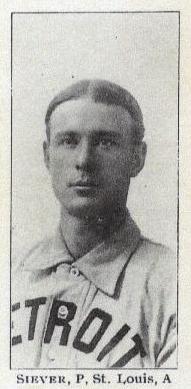
Edward Tilden Siever was an American baseball pitcher. He played professional baseball for 12 seasons from 1899 to 1910, including seven years in Major League Baseball with the Detroit Tigers and St. Louis Browns (1903–1904). He led the American League with a 1.91 earned run average (ERA) in 1902. In seven major league seasons, Siever compiled an 83–82 Win–loss record with a 2.60 ERA and 470 strikeouts in 1,507 innings pitched.
James Dennis Burns was an American businessman, hotel operator, politician, and baseball team owner. He was elected sheriff of Wayne County, Michigan, and served a four-year term. He also served three times as a delegate from Michigan to the Democratic National Convention, in 1908, 1912, and 1916. He was also the first owner of the Detroit Tigers in Major League Baseball, owning the club during the inaugural 1901 season.
Joseph Francis Yeager, nicknamed "Little Joe", was an American professional baseball infielder and pitcher. He played 10 seasons in Major League Baseball (MLB) for the Brooklyn Bridegrooms/Superbas, Detroit Tigers, New York Highlanders, and St. Louis Browns.
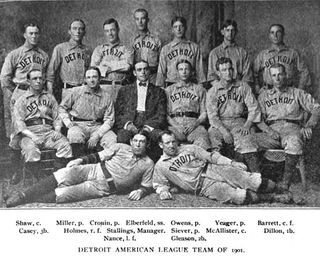
The 1901 Detroit Tigers season was the Tigers' first in Major League Baseball. The team was a charter member of the American League, which was originally formed as the minor-league Western League, of which it had also been a charter member. The Tigers finished in third place with a record or 74–61, 8+1⁄2 games behind the Chicago White Stockings. Most of Detroit's home games were played at Bennett Park, with Sunday games played at Burns Park due to Detroit's blue laws.
1902 was the second year for the Detroit Tigers in the newly formed American League. The team finished in seventh place with a record of 58–77 (.385), 30½ games behind the Philadelphia Athletics. The 1902 Tigers were outscored by their opponents 657 runs to 566. The team's attendance at Bennett Park was 189,469, sixth out of the eight teams in the AL. Detroit's blue laws prevented the Tigers from playing baseball at Bennett Park on Sundays. As a result, the Tigers played their Sunday home games for the season at Burns Park; a stadium constructed by owner James D. Burns.
The 2000 Detroit Tigers season was the team's 100th season and its first season at Comerica Park, after playing at Tiger Stadium since 1912, at the corner of Michigan Avenue and Trumbull Avenue.

Armory Park was a minor league baseball park in Toledo, Ohio. It was the home of the Toledo Mud Hens and their predecessors from 1897 until mid-season 1909 when Swayne Field opened.

Oriole Park was the name of multiple baseball parks in Baltimore, Maryland, all built within a few blocks of each other.
The Statesville Owls were a minor league baseball team located in Statesville, North Carolina. Statesville minor league teams played a member of the North Carolina Association (1900), Tar Heel League (1939–1940), North Carolina State League,, Tar Heel League (1953), Western Carolina League (1960–1962) and Western Carolinas League, winning three league championships.
The Rome Colonels was the primary moniker of minor league baseball teams based in Rome, New York between 1898 and 1951. Rome teams played as members of the New York State League (1898–1901), Empire State League (1905) and Canadian–American League. The Colonels were preceded in Rome by the Rome Romans.
The Corner Ballpark is a multi-purpose sports stadium located in the Corktown neighborhood of Detroit. Built on the former site of Tiger Stadium, the stadium opened in 2018 and is the home of the Detroit Police Athletic League. It is also home to numerous youth, college, amateur, and semi-professional sports teams and has also hosted several concerts during the spring and summer.